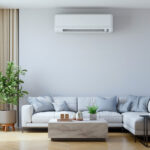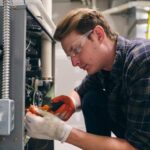
Are Heat Pumps Worth It?
Heat pumps are now starting to rival traditional gas furnaces as key HVAC components in Arizona. If you’re still sporting a gas-run heater, you may be wondering what all the hype is about. This week we are going to take a look at how heat pumps work and some factors to consider when deciding whether the switch is worth the initial investment.
How Do They Work?
Before we get into the benefits, it is important to have a basic understanding of how heat pumps work in the first place. These units pull heat from the outside of your home, heat it up even more, and then distribute it. This occurs through the use of electricity and refrigerant. Heat pumps are comprised of two main components: the condenser unit and the air handler. The condenser unit typically sits outside and is connected to the inside air handler by a refrigerant line.
Double Duty
Although called “heat” pumps, these systems can also operate in reverse to cool your home during the hot summer months. Warm indoor air passes over coils where heat energy is absorbed by the refrigerant, and the cooled air is then circulated throughout the space. This dual functionality is a major reason many homeowners ask, “Are heat pumps worth it?”. The ability to both heat and cool with a single unit simplifies maintenance and eliminates the need for separate air conditioning and furnace systems.
Upfront Costs
The upfront cost of installing a heat pump can be significantly more expensive than a traditional gas or even electric furnace. With that in mind, homeowners looking to have a heat pump installed should speak to their technician about potential rebates and credits for increasing energy efficiency. These can help make the initial cost more manageable.
Monthly Utility Bills
Switching from a gas-powered furnace to a heat pump can increase your electric bill by $50-100 while simultaneously decreasing your gas bill. Conservative estimates calculate that homeowners who switch to a heat pump could have the initial installation paid for within four years.
Next Level Efficiency
By far, the most impressive benefit of heat pump systems are their high efficiencies. This is because electricity is only used to power a couple of components within the system and not to heat or cool the air. This gives heat pumps the ability to provide efficiency ratings between 200-300%. In contrast, high-efficiency furnaces can offer efficiency ratings at a mere 95%.
If energy efficiency is important to you and you want to invest in a unit that will allow for both heating and cooling, a heat pump could be the solution. To learn more about heat pumps and if they are a good choice for your home, contact our team of experts at McMillin Air today!








0 comments